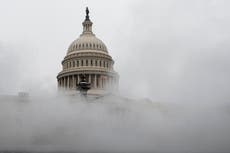What is the ‘three-martini lunch deduction’ Congress agreed to and why are Americans so furious?
‘There is no real evidence that the deduction increases actual spending at restaurants,’ says Georgetown law professor
The White House and President Donald Trump pushed for a so-called “three-martini lunch” deduction to be a part of the $900bn stimulus packages agreed to by Congress this week.
The item is a way to deduct from taxable income any expenses incurred while wining and dining business associates, and has been criticised from both sides of the aisle.
Seth Hanlon, former special assistant for economic policy to President Barack Obama and a senior fellow at the Center for American Progress, said: “It’s called the three-martini lunch deduction because when people are eating on their business’s tab, and especially when that tab is subsidised by other taxpayers, they will tend to opt for more extravagant dining options.”
The thinking is that you have to spend money to make money and that profits should be taxed but not gross income.
According to Brian Galle, a law professor at Georgetown University in Washington DC, the deduction has been abused for a long time.
He said taxpayers “quickly discovered that it's essentially impossible for the government to audit the true purposes of meals or other ‘business’ entertainment” and that the IRS had disputes concerning the use of the deduction “as early as the 1930s”.
In 1993, Congress cut the deduction to 50 per cent of the meal's cost. Mr Galle said limitations were imposed on how many times the deduction could be claimed as well as “fairly strict documentation requirements”.
Congress got rid of the deduction entirely in 2017 to offset other tax cuts. But the Trump administration decided to issue a regulation, finalised this year, which interpreted the new legislation as still permitting deductions for business meals.
Mr Galle said: “They claimed that the 2017 legislation had only ended the deduction for ‘entertainment,’ even though the word ‘entertainment’ had been understood to include business meals since the 1960s.”
The 2017 legislation ended the documentation requirements, and this week’s stimulus package ends the 50 per cent cut in the deduction, which means 100 per cent of business meals can once again be deducted.
Mr Galle said: “There is no real evidence that the deduction increases actual spending at restaurants. There is, however, pretty good evidence that it increases the likelihood that people will claim to have been dining with a ‘business associate’.”
Business people are “deducting their lifestyle and personal consumption. Which is not ordinarily allowed, in other words, regular people can’t deduct the cost of eating out,” Mr Hanlon said.
President Trump has repeatedly tweeted in favour of the deduction.
“I would guess it ended up in the bill because (Treasury) Secretary Mnuchin asked for it. So maybe that's reason to think the deduction would actually be useful. But then the president seems to believe quite a few things that are not, in fact, true,” Mr Galle said.
The deduction is a “terrible way to help struggling restaurants, compared to many other options. And even more so, it’s a terrible way to help restaurant workers,” according to Mr Hanlon.
He said: “It’s pretty inexplicable why President Trump would latch onto this policy. He’s either looking out for his own bottom line as an owner of resorts and restaurants, out of touch with economic reality, or both.”
Join our commenting forum
Join thought-provoking conversations, follow other Independent readers and see their replies
Comments


Bookmark popover
Removed from bookmarks